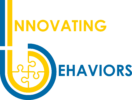Services
Intensive Behavioral Services (IBT)
Intensive Behavioral Intervention is a program for children with Autism that utilizes Applied Behavior Analysis (ABA) to address needs in language, social skills, and behavioral development. Treatment takes place within the home and community varying from 10-40 hours depending on need for treatment. Each child will have an assigned team that will provide one-to-one instruction. The staff are trained in ABA strategies to increase areas of needs and decrease maladaptive behaviors that create barriers throughout their day, such as non-compliance, aggression toward self and others, stereotypical behaviors, etc.. Additionally, the staff are supervised by a Board Certified Behavior Analyst (BCBA) in order to ensure all strategies are implemented correctly.
Functional Behavior Assessment (FBA)
Innovating Behaviors will conduct an FBA assessment to develop a treatment plan for the child. An FBA is a non-formal assessment used to hypothesize the function of behaviors that are not considered an emergency (e.g., crying, escape, etc.). An FBA is conducted through interviews, direct observation, and ABC data (Antecedent-Behavior-Consequence). The information is then utilized in order to determine the hypothesized function of the behavior. Based on the results a behavior plan can be put into place.
Methodologies Utilized
Discrete Trial Training (DTT)
Discrete Trial Training (DTT) breaks down complex skills into smaller components and each part is taught independently. Desired items are utilized in order to encourage the child to independently respond. DTT is used to help teach new skills varying from simple to complex such as language skills, play skills, and daily living skills. DTT is individualized based on each child’s needs and developmental standards.
Incidental Teaching
Incidental teaching is conducted in the child’s natural environment using the child’s current interest to guide instruction. Teaching opportunities are contrived and utilized throughout the day in order to facilitate learning. Incidental Teaching can teach joint attention skills, language skills, and functional skills as well as promote generalization of skills. For example, for child that is learning colors the Behavior Technician might utilize toys within the child’s environment in order to teach and generalize those skills.
Program Elements
One-to-One ABA Therapy
Sessions are run in a one-to-one ratio with the child and the Behavior Technician. Innovating Behaviors utilizes the principles of ABA in order to effectively motivate the child and decrease maladaptive behaviors. In addition, programs and behavior management protocols are tailored to the child’s needs. Data is collected during the treatment by the Behavior Technician and analyzed by the Clinical Supervisor in order to modify programs and increase socially significant behaviors. Additionally, sessions are run in a setting with minimal distractors present and as the child becomes successful, more distractors are introduced.
Parent Training
Parents are requested to meet with their Clinical Supervisor at least two times per month to review their child’s progress, address any concerns, and run generalized skills. During these sessions, parents will run targets that have been met by the child with the Behavior Technician. Additionally, the Clinical Supervisor will advise the parents on how to manage any maladaptive behaviors that may arise during the session. Furthermore, the Clinical Supervisor may review maladaptive behaviors with the parent/s that are occurring within the home and come up with strategies on how to manage them within the home.
Generalization
Skills are taught utilizing different materials, instructions, and objects in order to increase the child’s ability to generalize skills. The child will be required to demonstrate mastery of a skill with the Behavior Technician and then will be required to demonstrate mastery across parents/caregivers. Mastery is considered when the child is able to independently respond across environments, people, and objects at least two times at 80% of opportunities. Once a skill is considered mastered it continues to be targeted in settings with more distractions at least two times per month.
